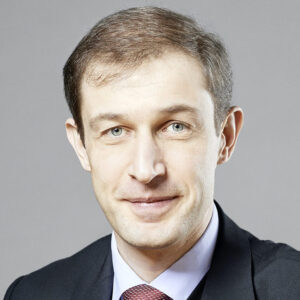
How private real estate, private debt and infrastructure are reshaping institutional investing, and why mastering their mechanics is now essential.
Real estate, debt, and infrastructure demand sharper valuation skills, deeper due diligence, and new thinking. “You must take off your listed-market clothes to put on your private-market ones.”
As global markets evolve and interest rates remain volatile, institutional investors are rethinking how they construct portfolios. Beyond public equity and bonds, private markets have emerged as a powerful engine of value creation and as a growing source of diversification and stability.
To equip professionals for this structural shift, the Amsterdam Institute of Finance (AIF) launches a new series of executive programs in spring 2026: Investing in Private Real Estate, Investing in Private Debt, and Investing in Private Infrastructure. At the heart of the series is Cyril Demaria, one of Europe’s foremost thinkers on private markets and author of multiple reference works, including Introduction to Private Equity, Debt and Real Assets and Asset Allocation and Private Markets.

“You must take off your listed-market clothes to put on your private-market ones. This is the first step in truly understanding, and eventually leading, within private markets.”
– Professor Cyril Demaria, EDHEC Business School & Head of Private Markets Strategy, Bank Julius Baer
A structural shift in portfolios
Private markets are expanding rapidly, from real estate to debt and infrastructure, and with that growth comes a deeper structural shift in how institutional investors allocate capital. According to Cyril Demaria, several common threads connect these evolving asset classes, as well as the three new AIF programs dedicated to them. “The first is the role of fund managers,” he explains. “These experts fuel the growth of private markets. They push the limits of financial markets by bridging an information gap through the due diligence they perform on private companies or assets. They negotiate and value assets, ultimately acquiring or investing in them.”
Their work doesn’t stop at acquisition. “Post-acquisition,” Demaria continues, “they support the significant transformation of these companies or assets. The playbooks for these value creations are diverse and rich. When successfully applied, the results are a substantial increase in the value of these companies and assets, which are then sold. This source of wealth is indeed attractive for institutional investors. It is less correlated with the wealth created by listed markets.”
A second driver is the role of funds themselves. These entities are often overlooked, but they are crucial. “Private market funds enable investors to pool their capital, thereby reducing the cost of investing in private companies and assets,” he notes. “They also help reduce the risk borne by investors, who are de facto exposed to a wider pool of private companies and assets. Furthermore, they support the generation of higher returns since the expertise of fund managers can be shared between fund investors.”
Bridging disciplines and perspectives
Each program brings together Demaria and a co-faculty member with a distinct lens on their asset class: Zoltan Szelyes for real estate, Olya Klüppel for private debt and Tim Whittaker for infrastructure.
These collaborations with renowned and highly experienced experts, Demaria says, are designed to give participants both a panoramic and a granular perspective. “What makes the co-faculty members unique is that they naturally bridge theory and practice. They can step back and provide a sweeping view of their area of expertise, and immediately dig deep into the intricacies of valuations and deal structuring.”
Such interplay between macro and micro perspectives, he explains, is exactly what elevates the learning experience. “That’s where AIF excels, and where these profiles find their natural match. The participants are motivated and engaged; they want responsive, experienced and versatile trainers. The value, and I would say the enjoyment, of such training sessions is the ability for participants to tap into expertise, whether theoretical or practical, directly at the source and absorb it in the best possible way.”
He adds with a smile: “The interactions in the room are rich and intense. That’s also why the trainers love these programs: teaching at AIF keeps our faculty brains young!”
“Valuation is the beating heart of private markets. When experts conduct their due diligence, they also negotiate the valuation in parallel.”
Managing risk and mastering valuation
For all their opportunity, private markets carry unique and sometimes hidden risks. “If there is no risk, there is no return,” says Demaria. “However, if there is risk, return is never guaranteed. And indeed, there are numerous and diverse sources of risk.”
He points out that valuation is the beating heart of private markets. “When experts conduct their due diligence, they also negotiate the valuation in parallel,” he explains. “This is a meticulous and lengthy process that spans several months. There are tools to mitigate risks, assess them and ultimately build a valuation that takes these risks into account. Beyond valuations, sources of risk are potentially everywhere. This is why the due diligence process cannot leave any stone unturned. This is a bespoke process, since each private company and asset is unique.”
Private markets as the engine room of innovation
As private markets continue to grow in influence, one key question arises: how can finance professionals, from asset managers to CFOs, develop the mindset and analytical tools to lead, rather than simply react?
“It starts by reflecting on the crucial difference between listed and private markets: information,” Demaria emphasizes. “Listed markets rely on the availability of detailed, high-quality, and frequent information. They support the pricing of financial instruments. Investment risk is measured through the variation of these prices. Private markets are the opposite of listed markets: information is scarce, inconsistent in quality, and often inaccessible except to specific parties. Company valuations and asset prices are not readily available. Risk cannot be measured through the volatility of prices or valuations.”
“Thus, finance professionals have to ‘take off their listed-market clothes to put on their private-market ones’. This is the first step in truly understanding, and eventually leading, within private markets.”
From knowledge to empowerment
AIF’s private markets programs are designed to help participants make that shift in perspective by combining theory, practice, and real-world insights. For Demaria, genuine learning goes beyond knowledge transfer; it’s about empowerment. “AIF provides this unique environment where professionals learn from professionals not only the practice, but the theory that underpins it. After completing these programs, participants should be able to use their knowledge autonomously, and keep building on it. They are empowered. This is the true value of executive education.”
Read more:
> Lessons from the new real estate cycle: expert Zoltan Szelyes on mastering complexity and finding value
> Navigating the changing reality of Private Debt: expert Olya Klüppel on risk, resilience and long-term value
Meet the expert
Cyril Demaria is Head of Private Markets Strategy at Bank Julius Baer and a private-markets expert advising on asset allocation, funds and direct deals. He began in 2000 investing in software and e-commerce with a VC fund, built a track record in direct investments, advised start-ups, and managed two late/growth-stage IT VC funds.
Previously he was Partner at Wellershoff & Partners and, at UBS’s CIO office, led private-markets research (buy-side). Combining practice and academia, he is an Affiliate Professor at EDHEC Business School in Nice and has previously lectured at top academic institutions, including EADA Business School in Barcelona. He has authored best-selling books such as Introduction to Private Equity, Debt and Real Assets (3rd ed.), Private Equity Fund Investments, and Asset Allocation and Private Markets (2021). He holds a PhD from the University of St. Gallen and degrees from Paris V, Paris VIII, HEC Paris.
Discover Cyril Demaria’s expertise and programs.
About the Investing in Private Markets Series
1. Investing in Private Real Estate
With Prof. Cyril Demaria & Zoltan Szelyes
Gain an edge in selecting funds and assets with state-of-the-art practice:
✔ Understand how private real estate creates value in portfolios
✔ Gain insight into fund structures, strategies, and performance metrics
✔ Apply valuation methods to spot opportunities across global markets
Learn more & enroll
2. Investing in Private Debt
With Prof. Cyril Demaria & Olya Klüppel
Position for success in a fast-growing sub-asset class with insights that work:
✔ Understand private credit: grasp strategies, structures, and instruments shaping today’s market
✔ Bridge theory and practice: use frameworks and cases to assess opportunities, risks, and impact
✔ Think like an investor: position private credit for stronger diversification and returns
Learn more & enroll
3. Investing in Private Infrastructure
With Prof. Cyril Demaria & Tim Whittaker
Build expertise in infrastructure funds and investments through best-in-class knowledge:
✔ Understand the full value chain of private infrastructure investing, from strategy to valuation
✔ Master core strategies and tools to navigate global infrastructure markets
✔ Apply institutional insights into fund structures, performance, and portfolio construction
Learn more & enroll
Learn from the experts shaping the future of private markets. Explore the full series or contact AIF for personal advice: +31 20 246 7140 |info@aif.nl